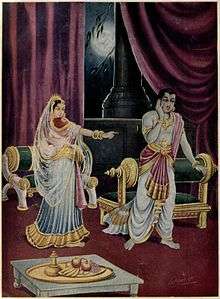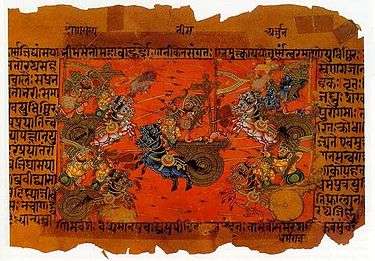Characters in the Mahabharata
Characters in the Mahabharata
List
- In the epic Mahabharata, Ambika is the daughter of Kashya, the King of Kashi, and wife of Vichitravirya, the king of Hastinapura.[1]
- Bhanumati[2] is a character in the Indian epic Mahabharata. She is the wife of Duryodhana, the primary antagonist and an incarnation of Kali (demon).[3]

- "Bambang Sumitra" is one of the sons of Arjuna from his marriage with Princess Larasati.[4][5][6][7][8] Bambang Sumitra has 13 other siblings from different mothers which are; Abimanyu, Bratalaras, Bambang Irawan, Kumaladewa, Kumalasakti, Wilugangga, Endang Pregiwa, Endang Pregiwati, Prabakusuma, Wijarnaka, Antakadewa and Bambang Sumbada.[7] His wife is Princess Asmarawati, daughter of King Suryasmara from Argakencana Empire.[4] His marriage with Princess Asmarawati did not have enough attention from Arjuna.[4] Hence, Semar took over his wedding ceremony.[4]
Ambika
In the epic Mahabharata, Ambika (Sanskrit: अम्बिका, ambikā) is the daughter of Kashya, the King of Kashi, and wife of Vichitravirya, the king of Hastinapura.[9] She was also the mother of Dhritarashtra, aunt of Pandu and grandmother to the Kauravas.
Bhanumati
| Bhanumati | |
|---|---|
| Information | |
| Affiliation | The consort of Duryodhana, who was an incarnation of Kali (demon) |
| Spouse(s) | Duryodhana |
| Children |
Laxman Kumara (son) Lakshmanaa (daughter)[10][11] |
Bhanumati (Devanāgari: भानुमती, IAST: Bhānumatī)[2] is a character in the Indian epic Mahabharata. She was daughter of king Chitrangada of Kalinga and Queen Chandramudra. She was the wife of Duryodhana, the primary antagonist and an incarnation of Kali (demon).[12]
According to the Mahabharata, Duryodhana abducted Bhanumati, the maiden of the fairest complexion, from her swayamvara with the help of his best friend Karna in the wake of having been rejected by her.[13] Bhanumati's mother-in-law Gandhari describes her to Krishna in the following manner posterior to the battle of Kurukshetra.
Behold, that lady of faultless limbs and slender waist, seeing this terrible carnage, falleth down, overwhelmed with grief. Beholding this princess, this mother of Lakshmana, O thou of mighty arms, my heart is torn with grief.
— Gandhari[10]
Chandravarma Kamboja
Chandravarma Kamboja is the first Kamboja king mentioned by name in the Mahābhārata.[14][15][16][17]
He appears to have been an ancient very powerful and renowned (vikhyaat) ruler of the Kambojas. He finds mention in the Adiparva section of the epic Mahābhārata, where he is stated to be an Asura or a demonic ruler [18][19][20]
Subala
Sudarma
Arshi
She was wife of Shakuni. She was also known as Arsh. She had a son named Uluka.
Vrikaasura
Vrikaasura (lit.Vrik means Renal and Asura means Demon, One whose Renal is made with a power of a demon) was younger son of Shakuni. Shakuni do the yajna for a protecter who protect his elder son Uluka. Vrikaasura was born with a demon Ambhlusha (ambhlusha was born for protecting kauravas and was killed by Ghatotkacha in night war). Vrikaasura was killed on 12th day of war by Nakula and ambhlusha was killed by Ghatotkacha in night war.
Ambhlusha
Ambhlusha was a demon born for protecting the Kauravas from a Yajna by Shakuni. He was killed by Ghatotkacha in the night war.
Chitrasena
Chitrasena was a character in indian epic mahabharata. He taught music and dance to Arjuna. He was a Gandharva king.
As Arjuna's teacher
Chitrasena was introduced in the epic in the Vana Parva, as a teacher of music by Indra. Indra foresaw that Arjuna would have to spend one year at King Virata's palace as a eunuch, during which time he would need the knowledge of music and dance. He wanted Arjuna to be trained by the king of the Gandharvas, Chitrasena. Chitrasena began his classes soon and the two also became good friends.[21]
When Urvashi cursed Arjuna to remain a eunuch for life, it was Chitrasena along with Indra who mediated with her to reduce the tenure of her curse to a single year. Chitrasena was able to achieve this by narrating to her the story of the Pandavas and the bravery of Arjuna.[22]
Dantavakra
Dantavakra (Sanskrit: दन्तवक्र), was the king of Karusha according to the Mahabharata and the Puranas. Dantavakra plays a minor role in the Mahabharata.
He was named Dantavakra because his teeth were crooked.
According to the Padma Purana (VI.274.16-7), he was of Chaidya lineage.[23]
According to the Vishnu Purana (IV.XIV.40), he was son of Vriddhasharman and Shrutadeva, who was Kunti's sister. Viduratha was his brother.[24] Shishupala was his cousin from maternal side.[25][26] He and Shishupala were the third and last birth of Vishnu's gatekeepers Jaya-Vijaya. He was an ally of Jarasandha, Kamsa, Salva and Paundraka, and an enemy of Vasudeva Krishna.[27]
At MBh 2:30 he is mentioned as the king of the Adhirajas. Pandava general Sahadeva defeated him, making him pay tribute, he then was re-installed on his throne. He attacks Krishna who was on his way to Dwaraka after the Rajasuya sacrifice (which Dantavakra had not attended, to protest the killing of Jarasandha) to avenge Shishupala, and his friend Salva — and he was killed by Krishna in a mace-duel.[28] His brother, Viduratha also dies in the same battle.[29]
Vrishparva
| Characters in the Mahabharata | |
|---|---|
| Information | |
| Children | Sharmishtha |
In Hindu mythology, Vrishparva was a Danava king with great powers and magic. He fought and won many wars against Indra with the help of his main priest Shukracharya. He made many attempts to kill Kacha, the son of Brihaspati. His daughter Sharmishtha is a friend of Devayani, the daughter of Sage Shukracharya, the guru of all Asuras, who married King Yayati and took Sharmishtha with her as her maid in punishment for her throwing of Devayani into a well during a furious argument.
References
- ↑ Law, B.C. (1973). Tribes in Ancient India, Poona: Bhandarkar Oriental Research Institute, p.105
- 1 2 Arthur Berriedale Keith (1992). The Sanskrit Drama in Its Origin, Development, Theory & Practice. Motilal Banarsidass. p. 213. ISBN 978-81-208-0977-2.
- ↑ Vaisampayana. The Mahabharata: Book 1: Adi Parva, K. M. Ganguli, tr. Retrieved 5 October 2017
- 1 2 3 4 Tim Penulis SENA WANGI (1999). Ensiklopedi Wayang Indonesia. Yogyakarta: SENA WANGI. p. 212.
- ↑ "Prabakusuma". Blueframe. Retrieved 14 April 2014.
- ↑ "Prabakusuma". Joglosemar. Retrieved 14 April 2014.
- 1 2 "Prabakusuma". Ki Demang Sokowaten. Retrieved 14 April 2014.
- ↑ "Prabakusuma". Sekar Budaya Nusantara. Retrieved 14 April 2014.
- ↑ Law, B.C. (1973). Tribes in Ancient India, Poona: Bhandarkar Oriental Research Institute, p.105
- 1 2 Gandhari. The Mahabharta: Book 11: Stri Parva, K. M. Ganguli, tr. Retrieved 5 October 2017.
- ↑ Anand Neelakantan (2015). Ajaya: Rise of Kali. p. 22
- ↑ Vaisampayana. The Mahabharata: Book 1: Adi Parva, K. M. Ganguli, tr. Retrieved 5 October 2017
- ↑ Narada. The Mahabharata: Book 12: Shanti Parva, K. M. Ganguli, tr. Retrieved 5 October 2017.
- ↑ Political History of Ancient India, 1953, p 150, Hemchandra Raychaudhuri, University of Calcutta.
- ↑ The People and Culture of Bengal, a Study in Origins: A Study in Origins, 2002, p 564, Annapurna Chattopadhyaya.
- ↑ Lord Mahāvīra and his times, 1974, p 213, Kailash Chand Jain.
- ↑ Ancient Indian History, 1988, p 149, Madhavan Arjunan Pillai.
- ↑ Epic Mythology, 1969, p 62, Edward Washburn Hopkins.
- ↑ See epic referential link: .
- ↑ Cf: Candravarma, the King of Kambojas, was the Asura or demon Candra, son of Diti... (Ref: Epic Mythology, 1915, p 62, Edward Washburn Hopkins – Hindu Mythology.
- ↑ Chandra Roy, Pratap. The Mahābhārata of Krishna-Dwaipayana Vyasa. Forgotten Books. pp. 98–99. ISBN 9781451018240.
- ↑ Chandra Roy, Pratap. The Mahābhārata of Krishna-Dwaipayana Vyasa. Forgotten Books. pp. 100–102. ISBN 9781451018240.
- ↑ Pargiter, F.E. (1972) [1922]. Ancient Indian Historical Tradition, Delhi: Motilal Banarsidass, pp.118-9.
- ↑ "Śrīmad-Bhāgavatam10. - Chapter 78. The Killing of Dantavakra, Vidūratha and Romaharṣaṇa - The Sattvic Spirit Veda Pages".
- ↑ "The Hare Krsnas - Krsna's Later Pastimes with Demons - Dantavakra and Viduratha".
- ↑ Law, B.C. (1973). Tribes in Ancient India, Bhandarkar Oriental Series No.4, Poona: Bhandarkar Oriental Research Institute, pp.87-9
- ↑ "The Hare Krsnas - Krsna's Later Pastimes with Demons - King Salva".
- ↑ "kasarabada.org".
- ↑ Pellerin, Gaetan. "The Killing of Dantavakra, Viduratha and Romaharsana".

